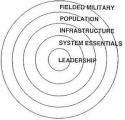The Political Department of the JNC was responsible for relations with the Arabs, ties with the Jewish Agency and negotiations with the British government. As the yishuv grew, the JNC adopted more functions, such as education, health care and welfare services, internal defense and security matters, and organized recruitment to the British forces during World War II. In the 1940s, departments for physical training, culture and press and information were added.
The report of the Anglo-American Committee of Inquiry issued in 1946, stated:
"The Jews have developed, under the aegis of the Jewish Agency and the JNC, a strong and tightly-woven community. There thus exists a virtual Jewish nonterritorial State with its own executive and legislative organs..."[1]
When the State of Israel was established in 1948, this departmental structure served as a basis for the government ministries. On March 2, 1948, the JNC decided to form an interim government and on May 14, 1948, (the expiration day of the British Mandate), its members gathered at the Tel Aviv Museum of Art and ratified the proclamation declaring the establishment of the State of Israel. The members of the JNC formed the provisional government of the nascent State of Israel.









 )
)



Bookmarks